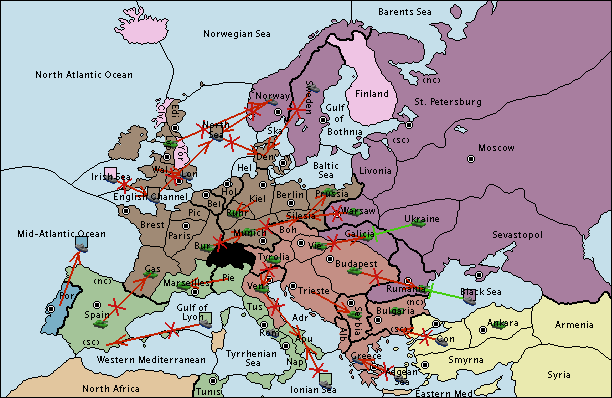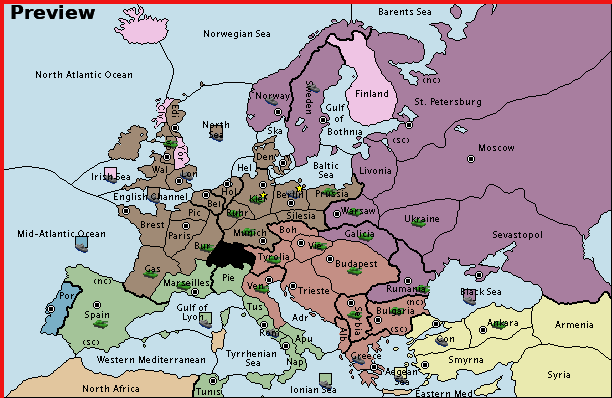Winter 1910 (Builds) – that’s a lot of failed move orders
To go back to the previous entry, click here.

Developments: England is gone; Italy is still very worried about me
- Well, Italy was pretty worried that I would lunge for Marseilles (as I surmised in my previous entry) and seems to have mostly guarded against me (Germany) while only doing what was minimally needed to protect against Austria. I guess his choices are pretty smart, because he probably would have protected himself from an attack I might have made, and he correctly blocked all the Austrian moves.
- France moved into Mid-Atlantic Ocean…crud. I think France moved there because he was pretty sure that I would move there with English Channel and wanted to bounce me, because he took a really huge risk of being eliminated when he moved out of Portugal (indeed, if Italy had moved there like I had hoped, Italy would have eliminated France and got a build).
- This is crummy for me because now I have to guard next year against France attempting to get into Brest, English Channel, or even Liverpool (if he starts by moving to North Atlantic Ocean). Probably France will just bounce Italy in Portugal (or maybe Italy will let him back in), but it is possible France could gamble that it’s more important to sneak behind my lines than to guard Portugal. Consequently, I really really hope that Italy tries to eliminate France by moving to Portugal. I’ll definitely guard against France sneaking into one of my centers, but will Italy have the guts to try to finish France off?
- Russia did what I thought he would do, but I am glad I got into Prussia. That should really compromise Russia’s defenses next year.
Strategic thoughts: what will Italy think?
Will Italy get my message? I moved almost everything I have towards the north and east against Russia and did a support-hold with Gascony. Italy wasted his turn (sort of) by guarding against me (Germany) when he could have taken Portugal, eliminated France, and got a build. I wonder, is Italy kicking himself over this, or does he not even care about eliminating France? I’m trying my best to signal to him that I am not hostile, and I do want him to eliminate France if this game doesn’t end in a solo win for me.

Orders: time for the 2 fleet builds? maybe not
- Alright, I had this idea earlier about getting 2 fleet builds and now I need to analyze whether that makes sense with how things have played out. Thinking backwards from the situation I need to create in Autumn 1911 that will let me take Norway or Sweden from Russia, I can figure out which units I need to build now.
- Since Russia only has 2 units in the north, all I need to take a center from Russia is to get 2 units bordering either center while also covering my centers from possible counterattacks.
- Ideally, I would like to get a fleet in Norwegian Sea and North Sea, a fleet in Baltic Sea, and an army in Denmark. Then I would attack Sweden with my army in Denmark supported by Baltic Sea and attack Norway by convoying my army out of Great Britain with one fleet supported by the other. This would take both centers at once, give Russia minimal retreat options, and allow me to continue to press forward with as much power as possible against St. Petersburg and eventually Moscow.
- Possible counter attacks by Russia would be if Russia snuck into Norwegian Sea and went for Edinburgh, got into Baltic Sea and threatened centers from there, or made an attack (or supported attack) on Denmark.
- Next year, with the units I already have, I have a decent chance of outguessing Russia with my North Sea fleet. I could move that fleet into Norwegian Sea or Skagerrak, and I think I have a chance of outguessing Russia (but if Russia guesses correctly, my move will fail since I can’t support myself into either sea zone). But if it worked, I could backfill with London supported by English Channel, which would probably work (and overcome any Russian move into North Sea, which Russia has attempted several times now). Alright… let me think about this more deeply as a scenario.
- Next turn, I could move North Sea to Skagerrak and backfill with London supported by English Channel. If I had an army in Kiel and a fleet in Berlin, I could move them to Denmark and Baltic Sea respectively; however, Russia would anticipate these moves and bounce one of them (most likely the fleet move). Then I would have 2 units bordering Sweden and 2 units bordering Norway (with North Sea, Skagerrak, and either Denmark or Baltic Sea). In order to guarantee that I take a center from Russia, I would have to take Norway or Sweden using the fleet in Skagerrak (because any support from Skagerrak could be negated by a poke).
- If I did the same thing but moved North Sea into Norwegian Sea (and it worked), then my follow-up attack would be to convoy my army on Great Britain into Norway supported by another fleet while poking Sweden with either Denmark or Baltic Sea to cut support.
- The convoy assumes that France hasn’t moved to North Atlantic Ocean. I can’t convoy my army away if France does that because I’ll have to guard Liverpool.
- This second scenario where I get into Norwegian Sea is pretty dang close to my ideal attack plan against Russia. The tricky part is that Russia might anticipate my move and move Norway to Norwegian Sea to cause my moves to fail. I think Russia is more likely to counter this move than to counter a move into Skagerrak for exactly the reason that it’s the stronger move; because it’s stronger, it’s more obvious and predictable. But in any case, neither of these attack plans calls for 2 fleet builds; in fact, it doesn’t matter whether I build a fleet or army in Kiel, since all the unit needs to do is move to Denmark.
- The advantage I kept talking about of building double fleets was that I would be able to immediately make a supported move into Baltic Sea. But is that really so advantageous here? If I make the 2 fleets, that probably telegraphs to Russia that I’m going to make a supported move into Baltic Sea, so Russia could try to counterattack somehow (say, moving Sweden to Denmark). But other than immediately taking Baltic Sea, I think my attack plan would be the same (moving North Sea to either Norwegian Sea or Skagerrak). Thinking hard about this, I don’t see what guaranteed control of Baltic Sea does for me that’s advantageous when right now I already have an army in Prussia that can threaten to move to Livonia (the convoy, or the threat of the convoy, using Baltic Sea isn’t needed now).[1]To elaborate, an powerful German tactic in a war against Russia is to have a fleet in Baltic Sea bordered by a German army that Germany can credibly threaten to convoy with that Baltic fleet. This is partly because Russia can quickly collapse if Germany gets an army into Livonia (which … Continue reading
- Furthermore, if somehow the diplomatic situation changes and I find myself needing to defend against attacks from the land (from Russia, Austria, Italy or some combination) then I’ll probably regret the double fleet build because those units can’t support-hold Munich, which is almost always the center those powers try to attack.
- And don’t forget what I’ve said many times about the necessity of army builds for Germany. In the long run, even considering my war with Russia over Scandinavia, I need as many armies as possible because fleets cannot ever help me take Moscow or Warsaw.
- Since Russia only has 2 units in the north, all I need to take a center from Russia is to get 2 units bordering either center while also covering my centers from possible counterattacks.
- Build an army at Kiel.
- Build a fleet at Berlin.
- Alright, I talked myself out of double fleet builds.
To continue to the next entry, click here.
Footnotes
| ↑1 | To elaborate, an powerful German tactic in a war against Russia is to have a fleet in Baltic Sea bordered by a German army that Germany can credibly threaten to convoy with that Baltic fleet. This is partly because Russia can quickly collapse if Germany gets an army into Livonia (which borders 3 Russian home centers). That situation is so powerful for Germany because the mere possibility that Germany could suddenly convoy an army from as far away as Kiel to as close as Livonia can scramble Russia‘s ability to make good guesses. Germany does not actually have to convoy anything, or convoy into Livonia specifically, for the situation to be advantageous to Germany. However, because I already have an army in Prussia (which borders Russia‘s home center Warsaw and can get into Livonia), the main tactical advantage of putting a fleet in Baltic Sea is redundant here. |
|---|